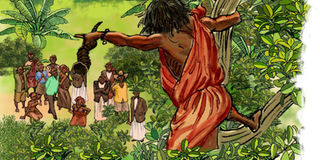How sorcerer ‘vanished’ from Luzira Upper Prison

Sewanyana pitches camp at the top of Mutundwe Hill near Nateete. He proclaims that he has been possessed by the spirit of the great Kibuka, Buganda’s ancient king of war. ILLUSTRATION BY DANNY BARONGO
Mathias Sewanyana was one of the first famous Ugandans to escape from the Maximum Security Prison, Luzira, in Kampala. He escaped from the famous Upper Prison in 1955 but was re-arrested.
Popularly known as Kibuka Kiganira Omumbale, Sewanyana was born to Joseph Baliddukamu, a Catholic catechist, in Busiro on Kampala-Masaka road.
From scanty colonial reports, Sewanyana was said to have been possessed by evil spirits while in primary school at Kyamaganda, which forced him to abandon education.
In an interview with the Drum Magazine in April 1965, Sewanyana’s brother said: “Well, the ghosts originally possessed his great-grandfather and, as you [Drum reporter] are well aware, in Buganda, when the old people die the spirits pick up one of the young grandsons.”
“In the case of our family, they [spirits] chose Mathias Sewanyana to be their priest and gave him the name Kibuka Kiganira Omumbale.”
From there on, he changed his name to Kibuka Kiganira Omumbale and started life as a sorcerer. Slowly, his fame spread beyond his village.
Sewanyana the sorcerer
In November 1953, Kabaka Edward Muteesa II of Buganda was exiled to the United Kingdom on the orders of the Queen of England for opposing the integration of East Africa. Muteesa was, however, allowed to return in October 1955 after a long political and legal jigsaw.
It was during the absence of the Kabaka that Sewanyana appeared on the scene in late 1954. From Busiro County, as it was known then, Sewanyana pitched camp at the top of Mutundwe Hill near Nateete. It was there that he proclaimed that he had been possessed by the spirit of the great Kibuka, Buganda’s ancient king of war.
He climbed onto a tree and shouted his voice hoarse, claiming that he had been sent by the spirits to deliver the exiled Kabaka back home.
He said he would transmit messages to the Kabaka in exile through blowing jembe (a horn). Many Baganda who wanted their king to return then started thronging Mutundwe Hill. Soon the numbers increased from hundreds to thousands. They started living on the hill, calling on the spirits day and night to return the Kabaka.
Besides claiming that he was Kibuka, Sewanyana also claimed that he could cure women of bareness. As the crowds grew, they became a threat to the authorities.
Officer killed, Sewanyana arrested
For some time, no government official, both local and colonial, could dare to go up the Mutundwe Hill. Since the area was under Buganda Kingdom, the arrest of Sewanyana and his followers would be effected by the Buganda police.
For close to a week, the Buganda police strategised on how to conduct the arrest with minimum damage. Death was ruled out of the options.
And it was at around 6am on February 13, 1955, that Inspector of Police Edward Stanley Mukasa, the head of Buganda police, and 47 of his officers stormed Mutundwe Hill.
No sooner had they arrived at the hill than the crowd confronted them. The policemen were forced to retreat. They ran back to Bulange, Mengo, for reinforcement.
At Bulange, they were reinforced with 31 more officers before marching back to Mutundwe. The irate crowd again confronted the police who were armed with batons and rifles.
A scuffle ensued and Constable Samuel Nsubuga was stabbed to death. According the police report, Nsubuga was killed by two unidentified men.
The police again retreated.
On February 28, 1955, Capt Anderson, a British officer, commanded a company (100 soldiers) of the Kings African Rifles and stormed Mutundwe Hill.
The crowd was immediately subdued by the army and Sewanyana was arrested. He was arrested together with two others, Bernado Walusansa and Ndabiddekunnamusa.
When the Buganda police later went to search the area, they discovered guns and machetes at the site.
On April 26, 1955, Sewanyana, Walusansa and Ndabiddekunnamusa were arraigned before High Court in Mengo. The trio was represented by Counsel David Lubogo.
On July 12, 1955, Justice Luis sentenced the trio to hang at Maximum Security Prison, Luzira.
Escaped from Upper Prison
From court, the trio was sent to the condemned section of the Upper Prison where security is on high alert day and night. But one night, one month later, Sewanyana mysterious vanished from the prison.
Sewanyana’s escape left many baffled. No door or padlock had been broken, only his beddings indicated that he slept in before the escape.
With no explanations to be offered, prison warders started torturing inmates to volunteer information on Sewanyana’s whereabouts. The colonial government instituted a commission of inquiry to establish how the sorcerer escaped from prison. But little was discovered.
After escaping, Sewanyana went and pitched camp at the rocks near Bombo Town and again started preaching about his capacity to return Muteesa from exile using his supernatural powers.
Again, the security forces went after him. On September 23, 1955, Sewanyana was re-arrested at the rock taken back to the Upper Prison.
When asked how he escaped, he said that Kibuka, Buganda’s king of war, helped him escape in the same way he would bring Muteesa back to Buganda from London.
He was kept in prison until October 8, 1962, when he was released under the Uganda Independence Amnesty.
In 1972, Sewanyana died under mysterious circumstances. His body was found floating on Lake Victoria near Entebbe Town.




